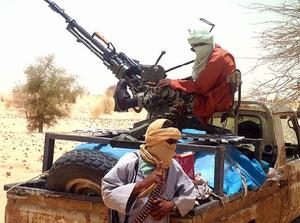Foreign affairsMali’s neighbors ready military operation to oust Azawad Islamists, unify Mali
Mali’s neighbors, increasingly anxious about break-away Azawad turning into a haven for Islamic militants, worried about waves of refugees fleeing the strict Sharia law imposed in the territory by the fundamentalist Ansar Dine group, and unconvinced of the ability of the fractured and weak Mali government to tackle the situation anytime soon, are planning to seek a UN Security Council resolution authorizing a military campaign by a coalition of west African countries to oust the Islamists and help reunify Mali; the coalition, led by Niger, is seeking French and U.S. logistical and operational support for the campaign

Azawad Islamist fighters prepare for war with Mali's neighbor states // Source: rivistasitiunesco.it
Three months ago, exploiting the preoccupation of Mali’s ruling elite with a military coup which toppled the civilian government on 22 March, Tuareg rebels declared the independence of a Tuareg-majority region in the country’s north-east, which they called Azawad. The region, two-thirds of land area of Mali, is the size of France, but has a small population of between one-and-a-half and two million people.
The Mali government is back in civilian hands, after a fashion, but it, and the country’s military, are too weak and divided to launch a meaningful campaign to reunify Mali.
The situation might have been regarded as an internal Mali affair, but during the past six weeks a fundamentalist Islamic group called Ansar Dine, which is affiliated with al Qaeda, has taken over Azawad, marginalizing the Tuareg rebels and imposing a strict Sharia law on a reluctant population. The UN reports that more than 400, 000 people, or nearly a quarter of Azawad population, have already fled the Islamists to south Mali, and thousands more are fleeing every day.
Mali’s neighbors, alarmed by the inability of the Mali government to deal with the situation, are taking it upon themselves to deal with the danger of an emerging jihadi base on their borders. Mali’s neighbors are also worried about the growing wave of refugees from Azawad: so far, most of those who left Azawad chose to go south and remain in Mali, but if unrest in the break-away territory continues, some of those fleeing the Islamists may choose to cross the border to Niger, Mauritania, Algeria, or Burkina Faso.
Yesterday, France’s president Francois Hollande met with Niger’s president Mahamadou Issoufou to discuss the growing danger stemming from the Islamist group’s take-over of Azawad. The BBC reports that Issoufou shared intelligence information with Hollande, information which showed that two Islamic groups in west Africa — Ansar Dine and Boko Haram — were being trained by jihadists from Pakistan and Afghanistan.
Issoufou said he intended to ask the UN to allow troops to be dispatched to Mali. “ECOWAS (Economic Community of West African States) has decided to refer to the Security Council with the objective of sending an armed force to Mali,” Yahoo! News quotes Issoufou to say. “It is not just a threat for the region, but the world … It is an international threat that needs an international response so this is why we have decided to take this to the Security Council,” he said.
The BBC reports that Issoufou also said that the West African countries would ask the UN Security Council to allow France and the United States to provide logistical and operational assistance to the military operation.
President Hollande said France would support the move, but that Niger and its neighbors must take the lead. “If an intervention is decided upon, it’s for the Africans to lead it — France, like other powers, putting themselves at the service of the United Nations,” Hollande said. “There is outside intervention that is destabilizing Mali and setting up groups whose vocation goes well beyond Mali, in Africa and perhaps beyond,” Hollande added, according to RFI (and see this Nouvel Observateur report).
Hollande explained that Paris would be ready to support military action as “there is a threat of terrorist groups taking root in northern Mali.” He repeated, though, that it was up to African nations to take the initiative in leading any military operation.
ECOWAS has said for about three weeks now that it has troops ready to enter Azawad, but the cost of such a mission, which peacekeeping sources estimate at more than $200 million, is an issue.
Hollande also said that France, a former colonial ruler o the region, would be ready to help restore stability in Mali if there is a Security Council resolution.
